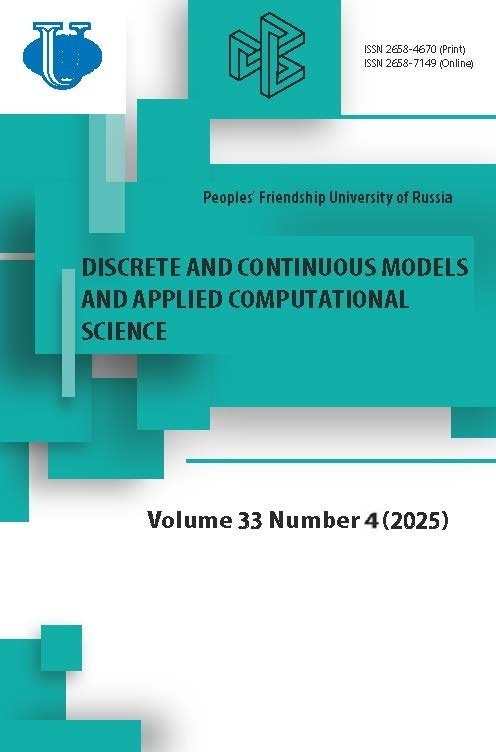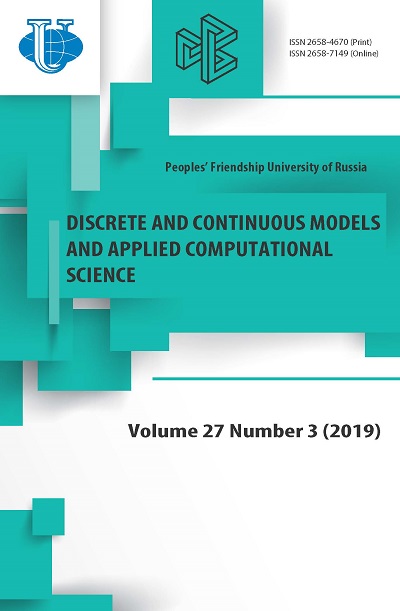Vol 27, No 3 (2019)
- Year: 2019
- Articles: 8
- URL: https://journals.rudn.ru/miph/issue/view/1279
- DOI: https://doi.org/10.22363/2658-4670-2019-27-3
Full Issue
Mathematical Modeling and Computational Physics
Geodesic motion near self-gravitating scalar field configurations
Abstract
We study the geodesics motion of neutral test particles in the static spherically symmetric spacetimes of black holes and naked singularities supported by a self-gravitating real scalar field. The scalar field is supposed to model dark matter surrounding some strongly gravitating object such as the centre of our Galaxy. The behaviour of timelike and null geodesics very close to the centre of such a configuration crucially depend on the type of spacetime. It turns out that a scalar field black hole, analogously to a Schwarzschild black hole, has the innermost stable circular orbit and the (unstable) photon sphere, but their radii are always less than the corresponding ones for the Schwarzschild black hole of the same mass; moreover, these radii can be arbitrarily small. In contrast, a scalar field naked singularity has neither the innermost stable circular orbit nor the photon sphere. Instead, such a configuration has a spherical shell of test particles surrounding its origin and remaining in quasistatic equilibrium all the time. We also show that the characteristic properties of null geodesics near the centres of a scalar field naked singularity and a scalar field black hole of the same mass are qualitatively different.


Charge diffusion in homogeneous molecular chains based on the analysis of generalized frequency spectra in the framework of the Holstein model
Abstract
We analyze velocity autocorrelation functions and generalized frequency spectra of charge distribution in homogeneous DNA sequences at finite temperature. The functions are calculated numerically in the framework of the semi-classical Holstein model. We show that for all the sequences, only one parameter of the system is mainly responsible for the charge kinetics. Character of individual motions contributing into the charge mobility is determined. Temperature-dependent regimes of charge distribution are identified.


Modeling and Simulation
Simulation of a gas-condensate mixture passing through a porous medium in depletion mode
Abstract
One of important tasks in a development of gas-condensate fields is to minimize hydrocarbons loss arising from the gas condensation in pores of the gas-bearing layer. The search for the optimal gas production regime is carried out both on the basis of laboratory experiments and on the base of computer simulation. In this regard, the relevant is the verification of the constructed mathematical models by means of comparison of numerical results with experimental data obtained on the laboratory models of a hydrocarbon reservoirs. Within the classical approach on the basis of the Darcy law and the law continuity for flows, the model is formulated that describes the passing a multicomponent gas-condensate mixture through a porous medium in the depletion mode. The numerical solution of the corresponding system of nonlinear partial differential equations is implemented on the basis of the combined use of the C++ programming language and the Maple software. Shown that the approach used provides an agreement of results of numerical simulations with experimental data on the dynamics of hydrocarbon recoverability depending on the pressure obtained at VNIIGAZ, Ukhta.
 205-216
205-216


Charge diffusion in homogeneous molecular chains based on the analysis of generalized frequency spectra in the framework of the Holstein model
Abstract
 217-230
217-230


Geodesic motion near self-gravitating scalar field configurations
Abstract
We study the geodesics motion of neutral test particles in the static spherically symmetric spacetimes of black holes and naked singularities supported by a selfgravitating real scalar field. The scalar field is supposed to model dark matter surrounding some strongly gravitating object such as the centre of our Galaxy. The behaviour of timelike and null geodesics very close to the centre of such a configuration crucially depends on the type of spacetime. It turns out that a scalar field black hole, analogously to a Schwarzschild black hole, has the innermost stable circular orbit and the (unstable) photon sphere, but their radii are always less than the corresponding ones for the Schwarzschild black hole of the same mass; moreover, these radii can be arbitrarily small. In contrast, a scalar field naked singularity has neither the innermost stable circular orbit nor the photon sphere. Instead, such a configuration has a spherical shell of test particles surrounding its origin and remaining in quasistatic equilibrium all the time. We also show that the characteristic properties of null geodesics near the centres of a scalar field naked singularity and a scalar field black hole of the same mass are qualitatively different.
 231-241
231-241


Simulation of a Gas-condensate Mixture Passing through a Porous Medium in Depletion Mode
Abstract
Objective: one of the important tasks in the development of gas condensate fields is to minimize the loss of recoverable hydrocarbons arising from the condensation of gas in the pores of the formation. The search for optimal modes of gas production is carried out both on the basis of laboratory experiments and on the basis of computer modeling. In this regard, the relevant verification of the constructed mathematical models based on comparison of computed data with data obtained in experiments on the laboratory model of the reservoir.
Methods: to simulate the passage of a multicomponent gas-condensate mixture through a porous medium in the depletion mode, an initial boundary value problem for a system of nonlinear partial differential equations is formulated. Its numerical solution is implemented on the basis of a combined application of C++ and Maple.
Results: in the framework of the classical approach based on Darcy's law and the law of continuity of flows, a model describing the passage of a multicomponent gas-condensate mixture through a porous medium in the depletion mode is formulated. It is shown that the approach used provides quantitative agreement of the obtained numerical results with experimental data on the dynamics of hydrocarbon recoverability depending on pressure obtained at VNIIGAZ (Ukhta).
Conclusions: the effectiveness of the developed approach and the possibility of its further use was Confirmed.


Computational modeling and simulation
On the properties of numerical solutions of dynamical systems obtained using the midpoint method
Abstract
The article considers the midpoint scheme as a finite-difference scheme for a dynamical system of the form ̇ = (). This scheme is remarkable because according to Cooper’s theorem, it preserves all quadratic integrals of motion, moreover, it is the simplest scheme among symplectic Runge-Kutta schemes possessing this property. The properties of approximate solutions were studied in the framework of numerical experiments with linear and nonlinear oscillators, as well as with a system of several coupled oscillators. It is shown that in addition to the conservation of all integrals of motion, approximate solutions inherit the periodicity of motion. At the same time, attention is paid to the discussion of introducing the concept of periodicity of an approximate solution found by the difference scheme. In the case of a nonlinear oscillator, each step requires solving a system of nonlinear algebraic equations. The issues of organizing computations using such schemes are discussed. Comparison with other schemes, including those symmetric with respect to permutation of and .̂
 242-262
242-262


Computational experiment in era of HPC
Abstract
In this note we discuss the impact of development of architecture and technology of parallel computing on the typical life-cycle of the computational experiment. In particular, it is argued that development and installation of high-performance computing systems is indeed important itself regardless of specific scientific tasks, since the presence of cutting-age HPC systems within an academic infrastructure gives wide possibilities and stimulates new researches.
 263-267
263-267
















